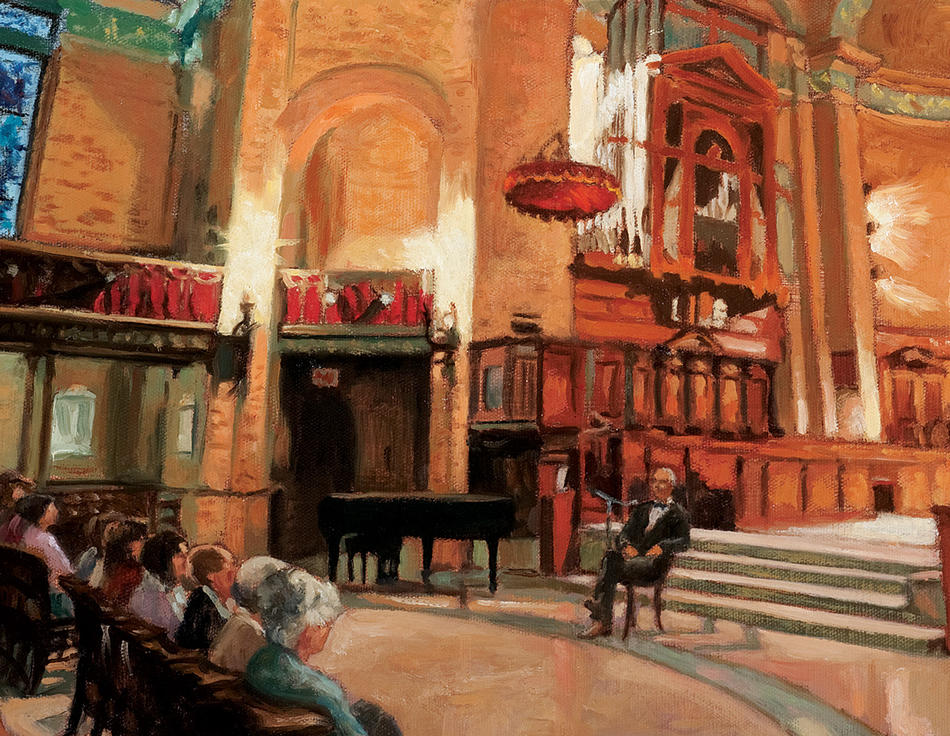On a Monday evening in October, Wm. Theodore de Bary ’41CC, ’53GSAS, ’94HON slowly made his way to the transept of St. Paul’s Chapel to deliver the Columbia Catholic Ministry’s annual Thomas Merton Lecture. As usual, the former provost was elegant in his trademark blue-and-white bow tie. But now, at 91, he chose to sit while speaking.
No matter. For the man who had pioneered the notion that classics of Asian literature and philosophy could be taught in a manner not unlike Contemporary Civilization and Humanities, the evening was something of a cross-cultural culmination. In the lecture, titled “Merton, Matteo Ricci, and Confucianism,” de Bary examined the relationship of Catholicism and Confucianism as expressed by the worldly Trappist monk of the College class of 1938 and the renowned 16th-century Jesuit missionary to China. De Bary had not known the latter. As an undergraduate, however, he did have a nodding acquaintance with the former.
“Merton had graduated a few years before,” de Bary told the audience of colleagues and friends. “But as a part-time English instructor and half-serious graduate student, he continued to hang out with the editors of Jester in their offices on the fourth floor of John Jay.”
A few days later, de Bary was settled in the fifth-floor suite of Kent Hall that he has occupied since 1989. Sporting the same blue-and-white bow tie worn at the lecture, the father of neo-Confucian studies in this country was surrounded by heaps of books, many of them thread-bound Chinese and Japanese texts carefully packed in beige cases, bearing markings beyond the comprehension of a casual visitor.
Merton was still much on de Bary’s mind. Both had been relatively big men on campus, having been members, for instance, of Philolexian, the venerable Columbia literary society. But de Bary had inclined toward student government and leadership, Merton toward the College’s literary life. De Bary embraced socialism; the future humanist flirted with communism. Following Pearl Harbor, one joined the Navy, while the other entered an abbey. “Our interests were very different,” said de Bary. “I think Merton’s religious inclination superseded everything else.”
If Merton found his calling at Gethsemane, de Bary found his at Columbia. Just as Merton was the public face of the Trappists, so de Bary became a totem of Columbia continuity. In the wake of the 1968 riots, he was the first chairman of the Executive Committee of the University Senate. His tenure as executive vice president for academic affairs and provost from 1971 to 1978 coincided with some of the most turbulent years in the University’s history.
But for de Bary, the classroom has always been paramount. The University’s John Mitchell Mason Professor Emeritus — a title named for Columbia’s first provost and equivalent to the highest academic rank of University Professor — de Bary has served as Special Service Professor since 1990, continuing to teach despite ostensible retirement. He still commutes to campus regularly from his home in Tappan, New York. On Mondays and Wednesdays, he takes the University’s Lamont shuttle from nearby Palisades to teach classes. On Friday, when coming in for committee work, he prefers to drive.
Even as provost, de Bary always kept one foot in the classroom, personally negotiating his lecture time with University President William J. McGill. “Teaching is a need,” de Bary said. “I’ve always looked forward to my classes. So few people are able and willing to teach undergraduate courses.”
On the other hand, de Bary can recall aging professors who stuck around too long — a fate he doesn’t wish to share. He says he is ready to yield the lectern at a moment’s notice, though so far no one has complained, despite his occasional senior moment. “Sometimes you need to pause because you can’t remember something and have to come back to it,” he said. “The most memorable occasion was when I said to the class that I couldn’t recall a certain word. And do you know what that word was? ‘Amnesia.’”
There are other forms of loss. This fall, for the first time in many years, de Bary sat in the Baker Field stands at Homecoming without his good friend Arthur Weinstock ’41CC, who passed away in April. Another compatriot, the human rights scholar and University Professor Emeritus Louis Henkin, who spoke at a 1990 symposium held in de Bary’s honor, died less than two weeks before the game.
No blow, however, has been more profound than the death in 2009 of his wife Fanny ’43BC, whom he married shortly after graduation. They celebrated their 60th and 65th anniversaries in St. Paul’s, the site of her memorial service and his recent lecture. “I miss her greatly,” he said softly. “But I don’t go around moping.”
Indeed, de Bary told with some amusement an anecdote from long ago. On New Year’s Day 1941, Merton and his old Jester and Philo comrades Robert Gerdy ’39CC and Ed Rice ’40CC visited Fanny and her sister on Long Island. As Merton recalled in The Secular Journal of Thomas Merton, he shared “three eggnogs out at Northport among those giggling Jane Austen girls.”
“Merton was a storyteller,” said de Bary. “My wife was not a giggly girl.”



